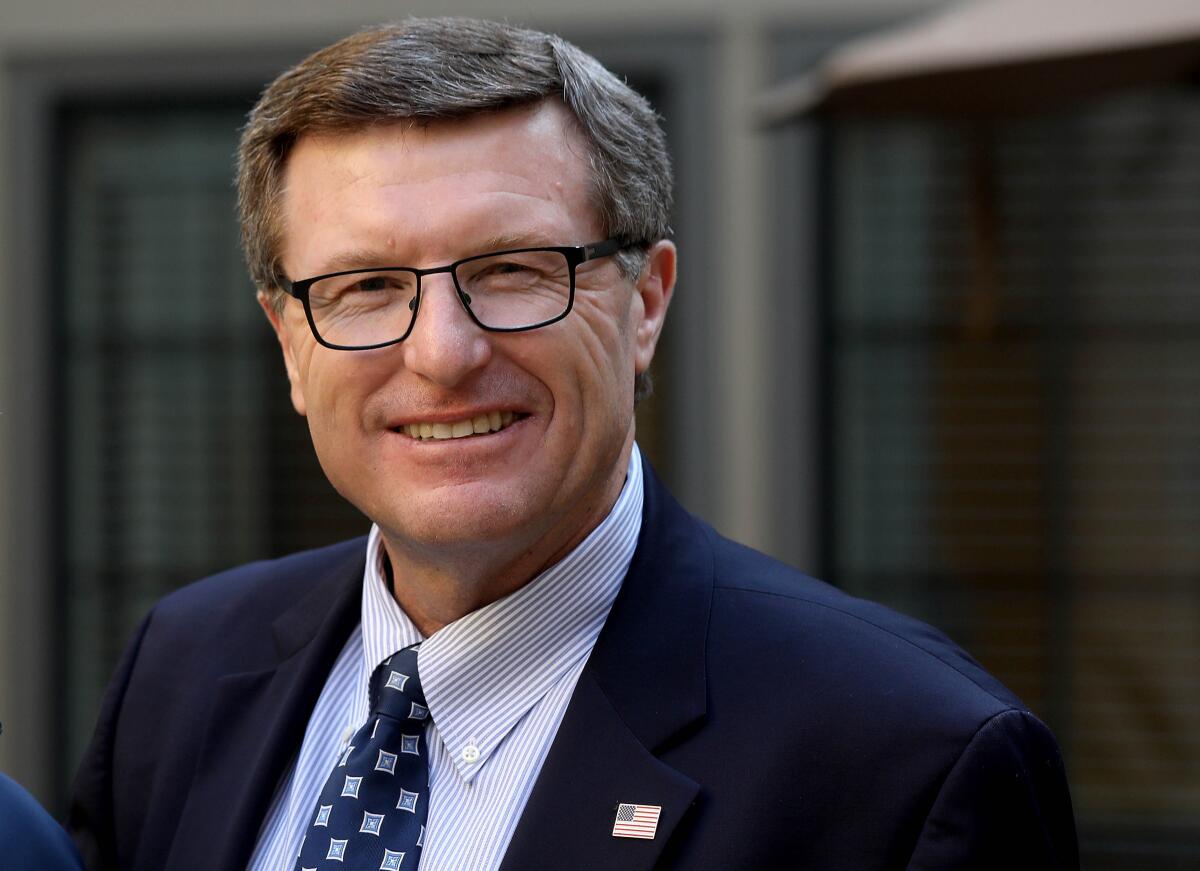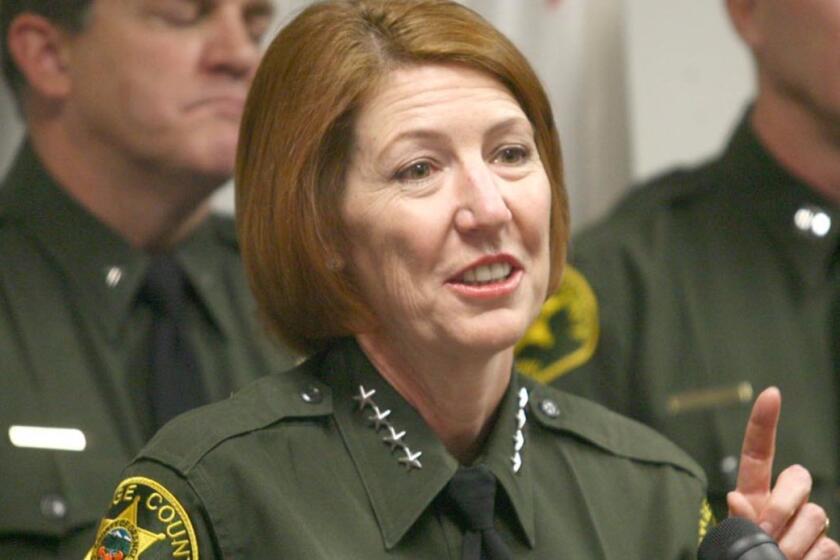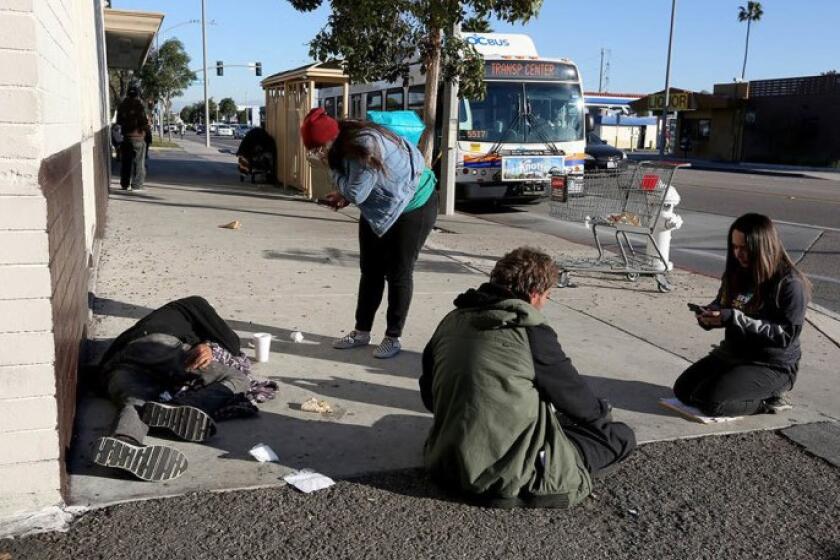Orange County federal judge dismisses criminal cases over lack of jury trials

- Share via
On what would be the first of three occasions in three days, U.S. District Judge Cormac Carney looked into his computer screen one recent January morning and apologized to a criminal defendant for the courthouse’s pandemic-related prohibition on in-person hearings. Then he repeated a move that had already drawn sharp objection from federal prosecutors: He announced the dismissal of all charges, part of a constitutional stance he said has left him feeling isolated and frustrated.
“I feel like I’m out on an island here; it’s me against all my colleagues,” Carney told robbery suspect Justin Henning. “I just have such a problem with what they’re doing.”
The Los Angeles-based Central District of California, which includes Orange County, hasn’t held a trial since March, with both jury and bench trials prohibited under COVID-19-related restrictions approved by a majority of judges. Carney is among a minority who believe trials should continue, as is happening in other courts, including Orange County Superior Court, and since September he’s been trying to summon jury pools for trials only to be rejected by the Central District’s chief judge, Philip Gutierrez.
As a result, Carney has granted dismissal requests from defense attorneys alleging speedy trial violations in four cases, including Henning’s robbery case, two gun possession cases against convicted felons and a 35-count indictment against a Newport Beach doctor accused of illegally supplying addicted patients with drugs.
Like Henning, physician Jeffrey Olsen was already out of jail on bond, as was one of the gun suspects, Steven Nicholson.
But the other felon accused of gun possession, Ronald Bernard Ware, was in custody when Carney dismissed his case Jan. 21, and Carney denied prosecutors’ request to impose a bond while they appeal his decision to the U.S. 9th Circuit Court of Appeals.
The judge’s dismissals are done with prejudice instead of without, which means prosecutors can’t pursue the charges again. They’re also an unprecedented rebuke of pandemic restrictions in the country’s largest federal court district, and they come amid a mixed approach to jury trials nationally that’s largely favored some form of in-person trial procedure as opposed to the Central District’s indefinite ban. According to differing opinions, they’re either a brave stance against an unconstitutional policy or a legally unsound move in an administrative fight between Carney and his fellow jurists.
In their appeal of Olsen’s dismissal, federal prosecutors said Carney “weaponized this case to combat his colleagues” and pointed to his statement that not allowing prosecutors to refile charges “is the only sanction with enough teeth to create any hope of deterring additional delay in the resumption of jury trials and avoiding further dismissals of indictments.”
“Punishing the government and letting [the] defendant escape the consequences of his wrongdoing are not [a] permissible means to prevent the suspension of jury trials by the court itself,” prosecutors wrote. They want Carney’s dismissal fully overturned, or at the least they want to be allowed to seek another indictment.
The 9th Circuit granted the U.S. attorney’s office’s request to expedite the appeal, and oral argument is scheduled March 18. Prosecutors had not yet formally appealed Carney’s three January dismissals as of Wednesday, but they indicated they would at each hearing.
Prosecutors cited in their brief the judge’s comparisons of Olsen’s lack of an immediate trial to civil rights struggles of African Americans and the U.S. Supreme Court’s Korematsu vs. United States decision allowing the internment of Japanese Americans during World War II. They implied his analogies were outlandish, but in his three recent dismissals, Carney continued to push the issue of jury trials as one of the utmost urgency.
“Given the constitutional importance of a jury trial to our democracy, a court cannot deny an accused his right to a jury trial even if conducting one is difficult,” Carney wrote in each of the three dismissal orders.
Gutierrez did not respond to interview requests. One of Carney’s colleagues in Orange County, U.S. District Judge David Carter, appears to share Carney’s concerns, telling TimesOC he’s “deeply concerned about the lack of access to justice for the poor and underprivileged by the indefinite closure of my court.”
“The Constitution has never and should never take an indefinite break,” Carter said.
Carney has repeatedly cited Orange County Superior Court’s ongoing coronavirus trial procedures while lamenting the Central District’s indefinite ban. In each dismissal hearing this month, he said video hearings compromise “the constitutional and legal rights of the litigants and sends a terrible message to the public that what we do in federal court is really not essential, and that their lives, liberties and rights are not important enough to have a hearing during the pandemic.”
Orange County Supervisors on Tuesday unanimously voted to rename a Sheriff’s Department training facility after controversial former Sheriff Sandra Hutchens, who died of cancer earlier this month.
Orange County Superior Court resumed jury trials in June after halting them in mid-March. As of Jan. 22, judges had conducted 145 in-person trials, including 52 felony, 73 misdemeanor and 20 civil, said court spokesman Kostas Kalaitzidis. Trials were suspended for most of December but resumed Jan. 11, with prohibitions currently in place that limit the number of total jurors at a time to twice-a-day groups of 160 at the Central Justice Center in Santa Ana, 40 at the Harbor Justice Center in Newport Beach and 40 at the West Justice Center in Westminster.
Carney also has cited the fact that grand juries met and returned 65 new indictments between June and December, though he noted the Central District halted those proceedings Dec. 9 and won’t resume them until Jan. 29.
In the Jan. 19 Zoom hearing, Henning’s lawyer, Jeff Tedford, said the U.S. Attorney’s Office “has been complicit in not trying to implement any, any protocols that can be put in place to have jury trials.”
Tedford said he’s appeared in court all over the state and has a trial soon in Santa Clara County Superior Court in San Jose, “where they are experiencing just as large a surge as we are in L.A. and Orange County.”
Henning, watching from home, thanked Carney for “being a fair judge and upholding the Constitution” and “allowing me a chance to move on forward with my life.”
Carney thanked him for his encouraging words and said he needed them “especially at this point in my career.”
“It’s kind of the twilight of my career,” the judge said.
Henning was among 12 men charged in an alleged robbery ring that prosecutors said targeted high-end watch dealers. A jury convicted him of gun and robbery charges in 2017, but Carney acquitted him and ordered a new trial.
The 9th overturned the acquittal but, in a twist, affirmed the order for a new trial, which sent the case back to Carney. The judge refused a single trial continuance before Henning filed the dismissal motion.
Carney continued trial once in June for Nicholson, who had been sentenced to five years in prison by a now-retired judge before the 9th Circuit overturned his jury conviction for felon in possession of a firearm. But Carney refused prosecutors’ next request in December, setting up the Jan. 20 hearing in which Nicholson’s indictment was dropped and his $50,000 bond was exonerated.
In the last case dismissed Jan. 21, the defendant, Ware, is a four-time convicted felon arrested in August on a charge of felon in possession of a firearm. Carney continued trial once in September, then refused prosecutors’ second request this month and granted a dismissal request by Ware’s public defender. Before the Zoom hearing ended, Carney warned Ware his release from jail “is going to take, I would imagine, a few hours.”
“So I just hope that you can be patient,” the judge said.
Ware thanked everyone.
“I hope that all you guys stay safe out there and stay blessed,” Ware said.
Meghann M. Cuniff is a contributor to Los Angeles Times Community News.
All the latest on Orange County from Orange County.
Get our free TimesOC newsletter.
You may occasionally receive promotional content from the Daily Pilot.




